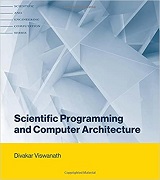
|
FreeComputerBooks.com
Links to Free Computer, Mathematics, Technical Books all over the World
|
|
- Title Scientific Programming and Computer Architecture
- Author(s) Divakar Viswanath
- Publisher: The MIT Press (July 28, 2017); eBook (Creative Commons Licensed)
- License(s): Creative Commons License (CC)
- Hardcover/Paperback 434 pages
- eBook HTML and PDF
- Language: English
- ISBN-10/ASIN: 0262036290
- ISBN-13: 978-0262036290
- Share This:

|
What makes computer programs fast or slow? To answer this question, we have to get behind the abstractions of programming languages and look at how a computer really works. This book examines and explains a variety of scientific programming models (programming models relevant to scientists) with an emphasis on how programming constructs map to different parts of the computer's architecture.
Two themes emerge: program speed and program modularity. Throughout this book, the premise is to "get under the hood," and the discussion is tied to specific programs.
The book digs into linkers, compilers, operating systems, and computer architecture to understand how the different parts of the computer interact with programs. It begins with a review of C/C++ and explanations of how libraries, linkers, and Makefiles work. Programming models covered include Pthreads, OpenMP, MPI, TCP/IP, and CUDA.The emphasis on how computers work leads the reader into computer architecture and occasionally into the operating system kernel. The operating system studied is Linux, the preferred platform for scientific computing. Linux is also open source, which allows users to peer into its inner workings. A brief appendix provides a useful table of machines used to time programs.
About the Authors- Divakar Viswanath is Professor of Mathematics at the University of Michigan.
- Computer System, Organization, and Architecture
- C++ Programming
- The C Programming Language
- Numerical Analysis and Scientific Computing
- Computer Operating Systems
- Parallel, Concurrent, and Distributed Computing and Programming
 Similar Books:
Similar Books:
-
 Computer Organization and Design Fundamentals
Computer Organization and Design Fundamentals
This book takes the reader from the basic design principles of the modern digital computer to a top-level examination of its architecture. The material is presented using practical terms and examples for a better computer systems design.
-
 Principles of Computer System Design: An Introduction (J. Saltzer)
Principles of Computer System Design: An Introduction (J. Saltzer)
This book takes a principles-based approach to the computer system design. Through carefully analyzed case studies from each of these disciplines, it demonstrates how to apply these concepts to tackle practical system design problems.
-
 The Elements of Computing Systems: Building a Modern Computer
The Elements of Computing Systems: Building a Modern Computer
This book gives a refreshingly new way of looking at computer systems as a whole by considering all aspects of a complete system in an integrated manner, as its comes to play in the construction of a simple yet powerful computer system.
-
 Basic Computer Architecture (Smruti R. Sarangi)
Basic Computer Architecture (Smruti R. Sarangi)
This book is a comprehensive text on basic, undergraduate-level computer architecture. It includes the combinational units, ALUs, processor, basic 5-stage pipeline, and a microcode-based design.
-
 Computer Systems: A Programmer's Perspective, 2nd Edition
Computer Systems: A Programmer's Perspective, 2nd Edition
This book introduces the important and enduring concepts that underlie computer systems by showing how these ideas affect the correctness, performance, and utility of application programs.





